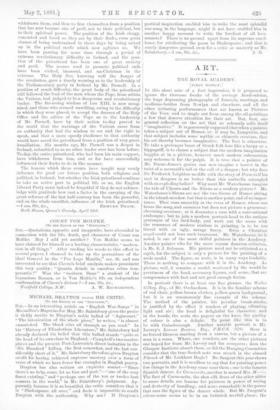MICHAEL DRAYTON versus HIS CRITIC.
[To THE EDITOR OF THE " SPECTATOR:]
Sin,—In an interesting article on "English War-Songs" in Macmillan's Magazine for May, Mr. Saintsbury gives the praise it richly merits to Drayton's noble ballad of "Agincourt." "The intoxication of the whole piece," he writes, "is almost anmatched. The blood stirs all through as you read." In his "History of Elizabethan Literature," Mr. Saintsbury bad already declared his belief that this ballad stands "quite at the head of its own class in England,—Campbell's two master- pieces and the present Poet-Laureate's direct imitation in the 'Six Hundred' falling, the first somewhat, and the last con- siderably short of it." Mr. Saintsbury therefore gives Drayton credit for having achieved supreme mastery over a form of verse of which we have fewer fine examples in English poetry.
Drayton has also written an exquisite sonnet—" Since there's no help, come, let Us kiss and part,"—" one of the very finest existing," and "perhaps one of the ten or twelve best sonnets in the world," in Mr. Saintsbury's judgment. Ap- parently because it is so beautiful, the critic considers that it is "Shakespeare all over," and finds it impossible to credit Drayton with the authorship. Why not? If Drayton's poetical inspiration enabled him to write the most splendid war-song in the language, might it not have enabled him in another happy moment to write the loveliest of all love- sonnets P There is no ground apart from its supreme excel- lence, for attributing the poem to Shakespeare; and that is surely dangerous ground, even for a critic so masterly as Mr.






































 Previous page
Previous page